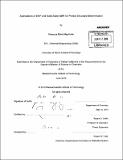Applications of DNP and solid-state NMR for protein structure determination
Author(s)
Mayrhofer, Rebecca Maria
DownloadFull printable version (4.407Mb)
Alternative title
Applications of dynamic nuclear polarization and solid-state nuclear magnetic resonance for protein structure determination
Applications of DNP and SSNMR for protein structure determination
Other Contributors
Massachusetts Institute of Technology. Dept. of Chemistry.
Advisor
Robert G. Griffin.
Terms of use
Metadata
Show full item recordAbstract
Magic Angle Spinning (MAS) solid state nuclear magnetic resonance (SSNMR) is a developing method for determining the structures and studying the dynamics and functions of biological molecules. This method is particularly important for systems, such as amyloidogenic fibrous proteins, that do not crystallize or dissolve well and are therefore not amendable to X-ray or solution NMR techniques. However, due to inherently low sensitivity, NMR experiments may require weeks to obtain spectra with sufficient signal-to-noise ratio. This issue is further exacerbated for biological systems of interest due to their large size and limited mass availability. The sensitivity can be increased by two orders of magnitude by combining MAS NMR with dynamic nuclear polarization (DNP). The application of SSNMR-DNP to protein structure determination is explored using malonic acid and a model peptide system, WT-TTR105-115. A custom built MAS-SSNMR probe is modified for the purpose of MAS-SSNMR DNP experiments.
Description
Thesis (S.M.)--Massachusetts Institute of Technology, Dept. of Chemistry, 2010. Vita. Cataloged from PDF version of thesis. Includes bibliographical references.
Date issued
2010Department
Massachusetts Institute of Technology. Department of ChemistryPublisher
Massachusetts Institute of Technology
Keywords
Chemistry.